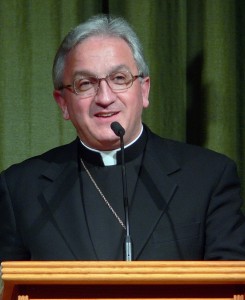 Archbishop Celestino Migliore, apostolic nuncio and permanent observer of the Holy See to the United Nations, has told a UN commission that population growth, rather than population control, can help societies overcome poverty. Archbishop Migliore made his remarks on February 8 at a meeting of the Commission for Social Development of the UN’s Department of Economic and Social Affairs, which is considering the theme of social integration.
Archbishop Celestino Migliore, apostolic nuncio and permanent observer of the Holy See to the United Nations, has told a UN commission that population growth, rather than population control, can help societies overcome poverty. Archbishop Migliore made his remarks on February 8 at a meeting of the Commission for Social Development of the UN’s Department of Economic and Social Affairs, which is considering the theme of social integration.
“Focusing on human relations necessarily calls for an openness to life which is a positive contribution to social and economic development,” said Archbishop Migliore. He continued:
In this light, too often population growth is viewed as the cause of poverty whereas it is a means of overcoming it, for only within the work force can the solution for poverty be found. It is therefore imperative that countries focus their efforts on finding the ways and means for ensuring that people receive the necessary skills, training and education so that human ingenuity can be harnessed in a way which promotes development and human rights. Similarly, where economic growth rates have declined, the answers lie not in trying to close society to others and pushing for population decline but rather in creating a society which is open to and encourages life. Promoting life and the family and finding ways to integrate the contribution of all people will allow societies to realize their full potential and achieve development.
For this reason, the family occupies a central place. The family is the first context in which children learn certain skills, attitudes and virtues which prepare them for the labor force and thus allow them to contribute to economic growth and social development. Education and formation is a long-term investment. It requires that policies promoting the family be based not only on redistribution but above all on justice and efficiency and assume responsibility for the economic and fiscal needs of families.
Archbishop Migliore also called for investment in “relational goods” rather “machine production” in order to promote economic growth. “In order to promote economic and social growth along with employment, it seems that the patterns of consumption should be focused upon relational goods and services which promote greater connection between people,” he said. “By investing in relational goods, such as medical care, education, culture, art, sport– all things which develop a person and require unique human interaction rather than machine production– the State, through its public intervention, would be addressing development at its root, while also promoting employment and long-term development. Social development and integration will not come about solely from technological solutions, since they concern primarily human relations.”
Turning to the issue of immigration, Archbishop Migliore decried xenophobia while urging immigrants to respect the law. “Intolerance and mutual friction between citizens and newcomers is always more noted in countries of intense immigration,” he said. “The phenomenon calls for strong attention to the two tracks of acceptance of migrants and respect for the law, on which the solutions to the problem can be found.”
This entry was posted
on Tuesday, February 9th, 2010 at 2:32 pm and is filed under News & Commentary.
You can follow any responses to this entry through the RSS 2.0 feed.
Responses are currently closed, but you can trackback from your own site.
Holy See at UN: Solution to poverty found in population growth, not population control
“Focusing on human relations necessarily calls for an openness to life which is a positive contribution to social and economic development,” said Archbishop Migliore. He continued:
Archbishop Migliore also called for investment in “relational goods” rather “machine production” in order to promote economic growth. “In order to promote economic and social growth along with employment, it seems that the patterns of consumption should be focused upon relational goods and services which promote greater connection between people,” he said. “By investing in relational goods, such as medical care, education, culture, art, sport– all things which develop a person and require unique human interaction rather than machine production– the State, through its public intervention, would be addressing development at its root, while also promoting employment and long-term development. Social development and integration will not come about solely from technological solutions, since they concern primarily human relations.”
Turning to the issue of immigration, Archbishop Migliore decried xenophobia while urging immigrants to respect the law. “Intolerance and mutual friction between citizens and newcomers is always more noted in countries of intense immigration,” he said. “The phenomenon calls for strong attention to the two tracks of acceptance of migrants and respect for the law, on which the solutions to the problem can be found.”
This entry was posted on Tuesday, February 9th, 2010 at 2:32 pm and is filed under News & Commentary. You can follow any responses to this entry through the RSS 2.0 feed. Responses are currently closed, but you can trackback from your own site.